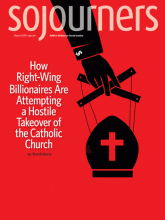IN ITS MOST BASIC FORM, theater is about transformation: altering voices, mannerisms, appearances, and scenery until what was becomes unrecognizable. Theater is also about resurrection: an empty stage brought to life, an untold story come alive. And no theater better embodies resurrection than Mosaic Theater.
In fall 2014, the Edlavitch Jewish Community Center (JCC) of Washington, D.C., forced its theater company, Theater J, to cancel the critically acclaimed Voices of the Changing Middle East Festival due to pressure from JCC donors upset with the festival’s controversial nature. Ari Roth, Theater J’s artistic director, protested the end of the festival’s groundbreaking interfaith dialogue and was subsequently fired. Afterward, he established Mosaic Theater, of which he is the founding artistic director.
“In a way, it was a very dramatic, abrupt, and even violent birth,” Roth told Sojourners. “It involved collateral damage, harsh words, a firing, accusations of censorship, a divorce. There was a rupture.”
Mosaic Theater was born from broken relationship—yet today it stands as a testament to inclusion, reconciliation, and renewal. Located on H Street in D.C.’s Northeast quadrant, Mosaic is a thriving fusion community committed to producing high-quality, socially relevant art in an uncensored environment. It is now in the middle of its fourth season, titled “How Hope Happens.”
“Moving to Mosaic meant we would lose Judaism but keep the prophetic piece. It would be multifaith, a mosaic of faiths united by common values. And the top value was a belief in the power of art to transform and transport people and communities to new places,” said Roth.
Read the Full Article

